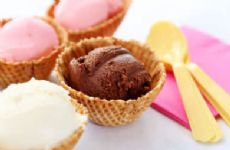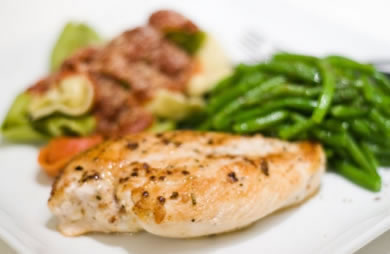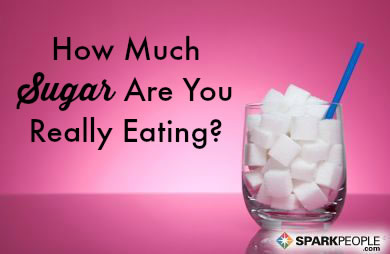|
Made with wholesome fruit, milk and ice, what's not to love about a healthy smoothie on a hot day? Not so fast—although they may sound innocent enough, these summer sippers could actually be massive calorie bombs in disguise. Many common selections at smoothie chains and fast food restaurants pack two times more sugar than a candy bar and more calories than a burger and fries! Before drinking up, read on for the best and worst picks from popular smoothie establishments across the country. (All servings are 16 ounces, unless otherwise indicated.)
Best Overall Smoothie: Panera Fat-Free Superfruit Smoothie This smoothie's got it all! It has a reasonable calorie count and is relatively high in satiating protein, thanks to the addition of Greek yogurt. It is also fairly low in sugar when compared with the others in the list. It would make a great morning meal or post-workout snack! Worst Overall Smoothie: Smoothie King ''The Hulk'' Strawberry This smoothie takes last place by a landslide. Tipping the scales at nearly 1,000 calories and 125 grams of sugar, this isn't a snack—it's more like two meals rolled into a syrupy-sweet, drinkable package! Although the Smoothie King menu states that this smoothie is designed for weight gain, we think there are healthier ways to do so that don't involve downing so much sugar all at once—much of which comes from a hefty serving of butter pecan ice cream in the ingredients list. A Note about Ingredients When comparing different smoothies, it's important to note that there is more to the bigger picture than just calories and fat grams. Some smoothies contain a boatload of chemicals, additives and thickening agents, while others have more minimal ingredients lists. For example, in Jamba Juice's Orange Carrot Karma Smoothie, the ingredients are easy to pronounce and recognize: Carrot juice, mangos, bananas and ice—that's it! Though it might sound as healthy and refreshing as the Jamba Juice smoothie, don't be fooled by the McCafe Mango Pineapple Smoothie—this concoction has an ingredients list a mile long to help thicken, color and sweeten. Furthermore, this ''fruit'' smoothie doesn't even contain any real fruit; it's all puree and juice from concentrate. See for yourself (from McDonalds' website): Water, Clarified Demineralized Pineapple Juice Concentrate, Mango Puree Concentrate, Pineapple Juice Concentrate, Orange Juice Concentrate, Pineapple Puree, Passion Fruit Juice, Apple Juice Concentrate, Natural (Botanical Source) and Artificial Flavors, Contains less than 1% of the following: Peach Puree, Cellulose Powder, Pear Juice Concentrate, Xanthan Gum, Peach Juice Concentrate, Pectin, Citric Acid, Colored with Fruit and Vegetable Juice and Turmeric Extract, Ascorbic Acid (Preservative), Cultured Grade A Reduced Fat Milk, Sugar, Whey Protein Concentrate, Fructose, Corn Starch, Modified Food Starch, Gelatin. Wow--that's a mouthful! Be sure to check the ingredients if at all possible when selecting your smoothie (many restaurant websites have it available), and stick with the short and sweet lists to make sure you're getting the good stuff. Finally, remember that making your own smoothies at home is the best way to control exactly what goes into them and avoid the crazy additives and sneaky calories that often find their way into restaurant versions. Plus, you'll save a good chunk of change—many smoothies can often set you back around $5-8 a pop! Try whipping up one of these healthy smoothie recipes the next time you get a hankering. Do you drink smoothies? What do you like to put in them? |
More From SparkPeople
|







.jpg)


.png)











.png)